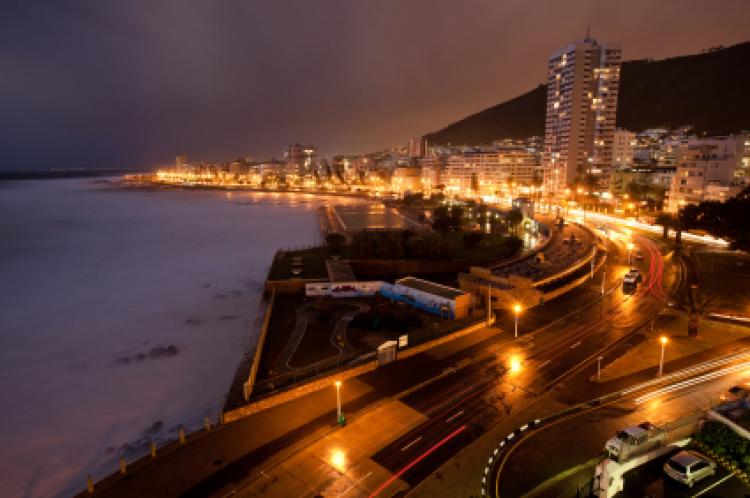
Saturn and Moon Meet in the Sky
Saturn and the Moon will meet up in the night sky for a close approach on November 10–11.
New Year festivities in South Africa are annually celebrated with excitement and happiness on January 1. New Year’s Day marks the start of the New Year in the Gregorian calendar, which is widely used in countries such as South Africa.
New Year's Day is a public holiday. It is a day off for the general population, and schools and most businesses are closed.

New Year celebrations are held across South Africa (scenic view of Sea Point, in Cape Town, pictured above) in January each year.
©iStockphoto.com/JacoleRoux
New Year’s Day is celebrated on January 1 and is a public holiday in South Africa, so many people have a day off work or school. Many New Year celebrations are enjoyed outdoors in South Africa because of the warm summer weather that many parts of the southern hemisphere experience during that time of the year. New Year’s Day is a popular celebration so it is common for festivities to last for up to two days.
Friends and family customarily come together on December 31 and as the old year ends, the New Year is announced and greeted with jubilation, euphoria, and elation. It is common to welcome the New Year with cracker explosions and, in some instances, breathtaking firework displays. The New Year is also celebrated in the company of up to 80,000 spectators at the foot of Table Mountain, a landmark that overlooks Cape Town.
New Year’s Day is a public holiday in South Africa. South Africa’s Public Holidays Act (Act No 36 of 1994) determines that if a public holiday falls on a Sunday, the following Monday shall be a public holiday.
Public transport is not affected and is usually busier than normal. Formal commercial institutions such as banks, post offices and small businesses are closed for business. Restaurants and other entertainment outlets are open with shortened hours.
There is some historical background behind the concept of the “Second New Year” and the significance of its celebration in South Africa. Slavery was common during the 17th century and slaves were not granted any days off work. They were granted a day off one day a year, which would be the first day after New Year’s Day on January 2.
The slaves used this opportunity to visit friends from the one house to another, dress up in festive attire and to celebrate their own “New Year”. They utilized the second day of the New Year as a way to protest against their oppressed lifestyle by engaging in cheerful singing, dancing, and parading through the streets.
The second day of New Year was an event that grew in later years, in which brass bands were incorporated and people’s outfits became more colorful. The bands and outfits were significant to specific groups and people started to perform and compete against each other as they marched throughout the streets of Cape Town. Today’s festivities occur on New Year’s Day with more than 13,000 painted faces belonging to people dressed in colorful outfits with props, umbrellas, whistles, and other items make noise. This occasion turns Cape Town’s streets into a vibrant rush of beats and lively lyrics.
| Year | Weekday | Date | Name | Holiday Type |
|---|---|---|---|---|
| 2019 | Tue | Jan 1 | New Year's Day | Public Holiday |
| 2020 | Wed | Jan 1 | New Year's Day | Public Holiday |
| 2021 | Fri | Jan 1 | New Year's Day | Public Holiday |
| 2022 | Sat | Jan 1 | New Year's Day | Public Holiday |
| 2023 | Sun | Jan 1 | New Year's Day | Public Holiday |
| 2023 | Mon | Jan 2 | Day off for New Year's Day | Public Holiday |
| 2024 | Mon | Jan 1 | New Year's Day | Public Holiday |
| 2025 | Wed | Jan 1 | New Year's Day | Public Holiday |
| 2026 | Thu | Jan 1 | New Year's Day | Public Holiday |
| 2027 | Fri | Jan 1 | New Year's Day | Public Holiday |
| 2028 | Sat | Jan 1 | New Year's Day | Public Holiday |
| 2029 | Mon | Jan 1 | New Year's Day | Public Holiday |
While we diligently research and update our holiday dates, some of the information in the table above may be preliminary. If you find an error, please let us know.

Saturn and the Moon will meet up in the night sky for a close approach on November 10–11.

Your astronomical bucket list—the biggest sky and space highlights of the next half-century you can see with your own eyes.

New Year’s Eve is the last day of the year, December 31, in the Gregorian calendar.

How does the 12-hour clock system work? Is midnight 12 am or 12 pm?